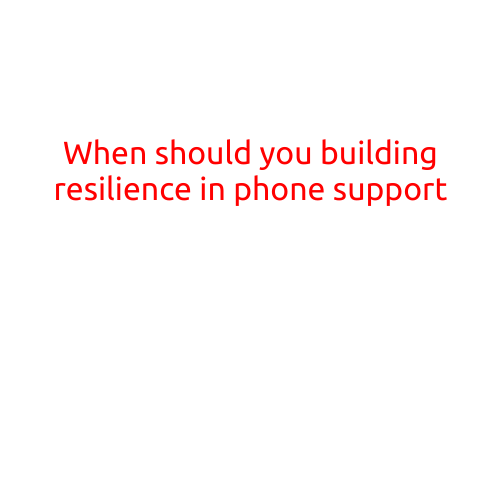
When Should You Build Resilience in Phone Support?
As a phone support representative, you are likely no stranger to dealing with the demands and stresses of the job. From handling high volumes of calls to mediating difficult customer interactions, your role requires a unique blend of technical skills, emotional intelligence, and resilience. Building resilience in phone support is crucial, but when is the right time to focus on it?
The Importance of Resilience in Phone Support
Resilience is the ability to withstand and recover from the constant barrage of customer inquiries, complaints, and demands. It’s the capacity to bounce back from setbacks, such as long hold times, technical issues, or frustrating conversations. Without resilience, even the most skilled phone support representatives can become exhausted, demotivated, and less effective in their roles.
Identifying the Need for Resilience
So, when should you build resilience in phone support? Here are some signs it’s time to focus on resilience:
- Frequent Burnout: If you or your team members are consistently reporting feelings of exhaustion, cynicism, or reduced motivation, it may be a sign that resilience needs to be prioritized.
- Decreased Productivity: When call volume increases, do you find yourself or your colleagues struggling to keep up with demands? This could be a sign that resilience is needed to cope with the workload.
- Escalating Customer Complaints: Are customers becoming increasingly angry or frustrated with your responses? This may be a sign that your team needs to develop more effective communication strategies and build resilience to handle tense interactions.
- Team Turnover: High turnover rates among phone support teams can be a symptom of burnout, poor workload management, or lack of resilience. Addressing resilience can help reduce turnover and improve teamwork.
- Feedback from Customers: Rarely do customers explicitly ask for help building resilience, but if they do, it’s likely a sign that you or your team are struggling to manage stress and emotions in customer interactions.
How to Build Resilience in Phone Support
So, how can you build resilience in phone support? Here are some strategies to help:
- Develop Emotional Intelligence: Recognize and manage your emotions to better respond to customer needs. Practice self-awareness, empathy, and effective communication.
- Prioritize Self-Care: Encourage team members to prioritize self-care activities, such as meditation, exercise, or relaxation techniques, to reduce stress and improve well-being.
- Improve Time Management: Train your team to manage their time effectively, prioritize tasks, and minimize stress caused by heavy call volumes or tight deadlines.
- Emphasize Teamwork: Foster a culture of teamwork and collaboration. Support each other, and recognize individual and team achievements to boost morale and motivation.
- Provide Continuous Training: Offer regular training and coaching to improve technical skills, communication strategies, and conflict resolution techniques.
Conclusion
Building resilience in phone support is crucial to maintaining a positive and productive team. By recognizing the signs of burnout, decreased productivity, and escalating customer complaints, you can take proactive steps to address these issues and prioritize resilience. By implementing strategies such as emotional intelligence, self-care, time management, teamwork, and continuous training, you can help your phone support team become more resilient, effective, and customer-focused.





